Outgoing Bloomington mayor on pandemic, housing, justice, annexation, city's future
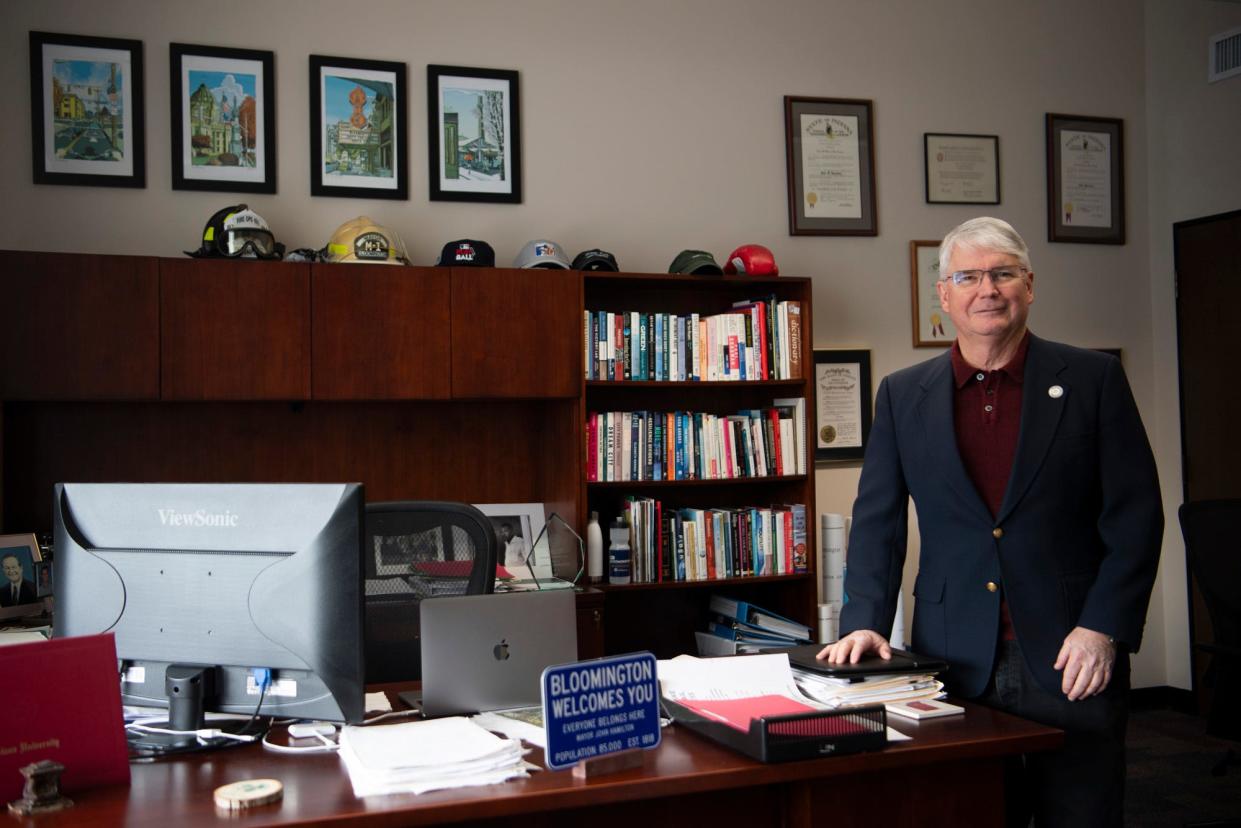
Editor's note: After eight years as mayor, John Hamilton is leaving office this week. In an exit interview, he listed among his team’s accomplishments the increase in affordable housing units, a growing and diversifying economy, improved infrastructure and quality of life. But he said challenges related to public health, criminal justice and annexation remain. This Q&A was edited for clarity and brevity.
Affordable housing and building height in Bloomington, Indiana
Q: How has your administration addressed affordable housing?
John Hamilton: We increased the pace of affordable housing production by 20-fold compared to the previous eight years or 10 years. So, we have transformed the engine of affordable housing in Bloomington and that's been really important. It still needs to keep going, but having 1,400 more units of affordable housing and an engine to do that and financing to do it and programs and zoning, that does add up. It's going to be important forever, but I think we've got good momentum.
Next to be built? 225 unit apartment complex planned for downtown Bloomington
Q: The community has seen lots of new high-rise apartment complexes, and the complaint one sees invariably on social media is, ‘Oh, great. More overpriced apartments for students with wealthy out-of-town parents.' When are we going to see houses built for the people who are living and working here? What can and should the community and the university do to add to the housing stock?
JH: At a simplistic level, there's two ways to get more affordable housing. One way is getting more housing; more supply will help in the long run. And if you think about the opposite, if you don't have more housing, it's going to get worse. And we've had about 6,000 units of housing added in the last eight years and in the city.
The second way is to intentionally subsidize, incentivize, create explicitly affordable housing. And you need to do both, and we've done both ... with 6,000 units altogether and 1,400 of those being intentionally and explicitly affordable, of different kinds. You have to keep doing both. And the way you can subsidize housing is to find land that you can make available and we do that by buying Hopewell, by getting land from a developer on Arlington Road. We could do that with IU, or IU could dedicate land for things like that. Anybody who owns land can do that.
We put in place new zoning codes that give incentive of height and floorplate size for doing affordable housing and that's proven interesting and effective for some developers. That needs to be calibrated constantly.
You can do it directly with money. We do that too. We have a development fund. We have now $1 million a year of economic development local income tax money going into affordable housing, and we're trying to leverage that from other partners.
Now on the market side, to get more housing altogether, you’ve to figure out where it goes. And annexation is relevant to that. Deciding where in our community we want housing to be developed. We've obviously had debates about density in our community. That's a really important debate to continue. We have to debate about how high things should be and where things should be located.
And we also have a new program in the last few years for permanently affordable homeownership. We've got a land trust and a community development corporation, Summit Hill, under the Bloomington Housing Authority, which is a really important engine.
So it's a complicated problem. But those two fronts, I think we just have to keep advancing.
Q: Some community members have criticized the push to add more housing units because, in their eyes, the additional units never appear to be helping people who are living here. They’re not seeing rents go down. They’re not seeing more available homes. What explains that disconnect?
JH: It's a constant challenge. Look, everybody in America should have a right to safe, decent housing, and we have big waiting lists on our public housing. We house 1,400 households in public housing in this city. That's a pretty big number. That's 3,000 or 4000 people that are in public housing, but more people want to be here.
And I think some of this debate is whether the community of Bloomington — not just the city — is going to grow in population, and I think the answer is yes. If you have a beautiful city that's great to live in, with jobs and opportunities, people are gonna want to live here, and that's a good thing. We have to plan for it and manage it. We should think about the Bloomington region having 250,000 people in it in the next 15 years or so.
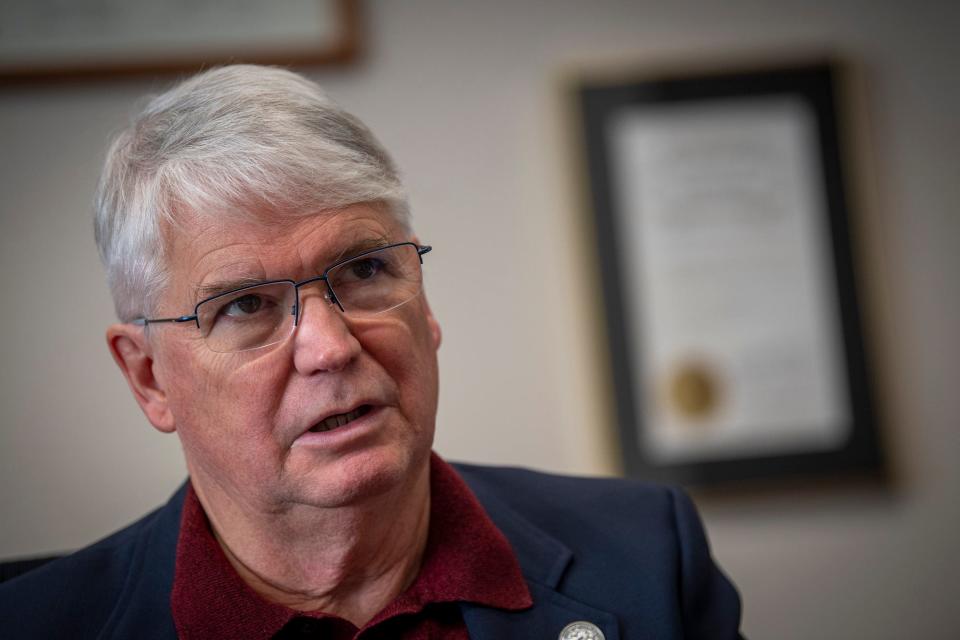
That means a bunch more people have great quality of life and can enjoy this city, and that we're sharing it with others, which we should do. It also means, as a city that size, you have the opportunity to create more arts and more dining options and more entertainment options and you can support more programming. But some people are not sure they want Bloomington to grow in population. And that's a public debate we have to have. I think a city like us should grow, should welcome people, diversify, and continue to thrive.
Q: You mentioned building heights. How do you think about that?
JH: These are all balances and trade-offs. We definitely get used to what we have. And I think height is going to be an important part of Bloomington’s future. Done well, done with good design and good placement, it's good for us. I don't think we should be afraid of it. I think we should embrace it as creating more opportunity for others and creating a more sustainable city.
Now it's complicated. There's a lot of balancing that has to go on. Before my time, Cook wanted to build a significant building a little bit north of the square. The city council turned them down in a close vote. I think that probably was not good for Bloomington’s trajectory.
Catalent, broadband, water in Bloomington
Q: What would you say your major accomplishments are as mayor?
Economy: On the economy, I feel very good about Bloomington. Look, for 50 years Indiana's economy has lagged the country's. Our share of the national income has declined. Our per capita incomes have not moved in the direction we want as a state compared to the country. So when you're in a city in that state, you’ve got to do what you can to fight that current. And I think we're doing that well. Having a tier 1 university is awesome. Connecting with that university and connecting it to jobs and helping them do what they want to do is important. So we've had over $3.5 billion of investments. Things like the regional academic health center, transformative, important. Catalent’s purchase of $1 billion. Baxter sold for $4.5 billion this year. Those are good signals of investment in the future of Bloomington. And then, of course, the trades district, the Mill, the fastest growing coworking space, the tech sector integration with Crane and IU, organizing our emerging tech center, being named emerging tech city of the state, recently. Wages growing faster in our city than our peers, generally than in the state. And we are diversifying from being dominated by a university and a company or two to trying to expand.
Infrastructure: I know we don't quite see it yet, but I think the digital infrastructure is really important for the city's future, too. A mayor should think about, of course you have to manage day to day and you have to make sure services are provided, but your biggest value add is how do you change the trajectory of a city? How do you help a city's trajectory move positively? And I think the digital infrastructure is one example. We will have fiber to every premise essentially built as infrastructure, which means it'll increase competition for many, many years. It will be critically important to have that great digital connectivity. It took a while. The Trump presidency, the pandemic and the recession slowed that down but we have a company that's investing well over $50 million for infrastructure.
Water, public housing, transit: Getting our water system funded, strong. The same with our public housing system. The same with our transit system. These really important building blocks of the future, I think, are in really good shape to keep thriving. And I should mention finances. When I came in, we had healthy surpluses, but not much capacity to do a lot more. We now have the economic development local income tax, the public safety local income tax, a series of bonds that have helped us do investments and I think the city's on very strong financial footing.
Quality of life: And then lastly, it's just making it a fun city to live in, making it beautiful and quality of life, and great programs and the Parks Department does that and community Family Resource Development does that, and trying to make sure we cultivate the downtown arts and that investment in the downtown Bloomington Inc. All that stuff's good.
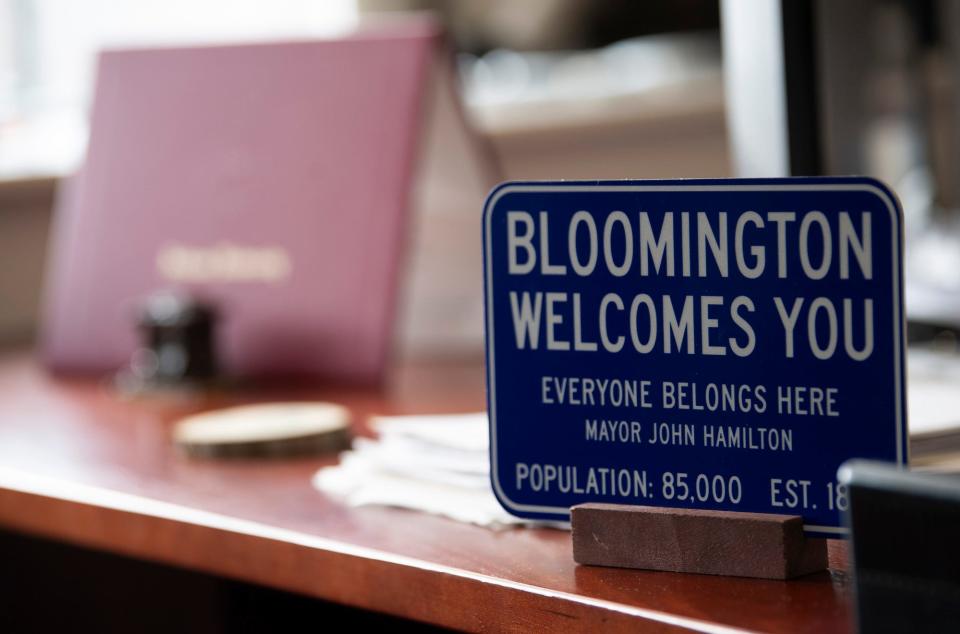
Bloomington annexation court cases: 'I may be a witness'
Q: What about things that you wish you accomplished that you didn't or couldn't?
JH: Annexation: That’s the biggest. That's pending. You can't be a thriving, successful city if your borders don't change. Look around the country. Look at cities that got surrounded by suburbs and got frozen. That is not a good situation for Bloomington. So I'm frustrated with how that developed with the state government illegally intervening and then illegally intervening again in ways that stopped the city from doing what every city should do and we had done for 185 years.
Q: Some people who oppose annexation say you should have reached out more to the people who would be affected and then maybe you would have convinced more people not to vote against it. Does that resonate with you?
JH: I did not want to have a lot of private conversations about the map of annexation, without having a lot of conversations at the same time. The only way to do that is to put out a draft map and start the conversations, which is what we did. Could it have been done differently? I'm not sure. But basically you need to have a map that starts the conversation and then you have the process to decide whether it’s the right boundary. Unfortunately, the deals on annexation had been struck over the last 20 years where sewer service was provided outside the city in exchange for specific agreements to join the city. Those transactions were important and they were fair and they were appropriate and they were typical. And, with those deals, the whole annexation area should have been completed. Most of the people in those areas had already agreed to be part of the city.
So I don't think it's surprising that somebody who got sewer service and lives right next to a great city says if you gave me the choice between paying more taxes and being in the city, or being right next to the city and paying fewer taxes but being able to enjoy much of the city, for many people that's a rational choice. Now, I think it's not for the good of the community, but that individual choice, I can understand that.
Q: Are you going to be participating in the annexation-related court cases?
JH: I think I may be a witness. I obviously won't be the mayor, but I may be involved. It'll be up to the parties who they call for the trial. I don't think I'll be involved in the constitutional one, which is just a legal argument about the waiver constitutionality. But the issue of the west side trial, I could be involved, but that's basically up to the litigants.
Q: Have you had conversations with Mayor-elect Kerry Thomson about that?
JH: I certainly counseled, suggested, advised Mayor-elect Thomson in my role now that annexation is very important for the future of the city. And I've strongly encouraged her to continue to pursue the city's interest in that area.
Can annexation be stopped? Two mayoral candidates want to 'halt' Bloomington's annexation. What you need to know.
Criminal justice, public health: ‘We need … to do more.’
Q: What are the major problems plaguing Bloomington going forward?
JH: It's tough being in Indiana. We have headwinds because of what the state government does and doesn't do. That includes reproductive rights as a damage to our city that's going to continue to be a challenge. It includes underinvesting in public education, public health. We are in competition with cities all across America, and all across the globe, to be a great place to live and a great place to grow jobs, and our state government, in my view, can be an impediment to that. Locally, we have to figure out where people are going to live, how people are going to be here, how to be more inclusive, how to open doors to new workers, new families.
When I came into office, I viewed the jail and its services to our community as not my responsibility. So I didn't get involved a lot in that. I think we have a moral stain on our community because of the way our jail operates and has operated, and we should have a moral commitment to improving public health services, particularly around mental health and substance use disorder.
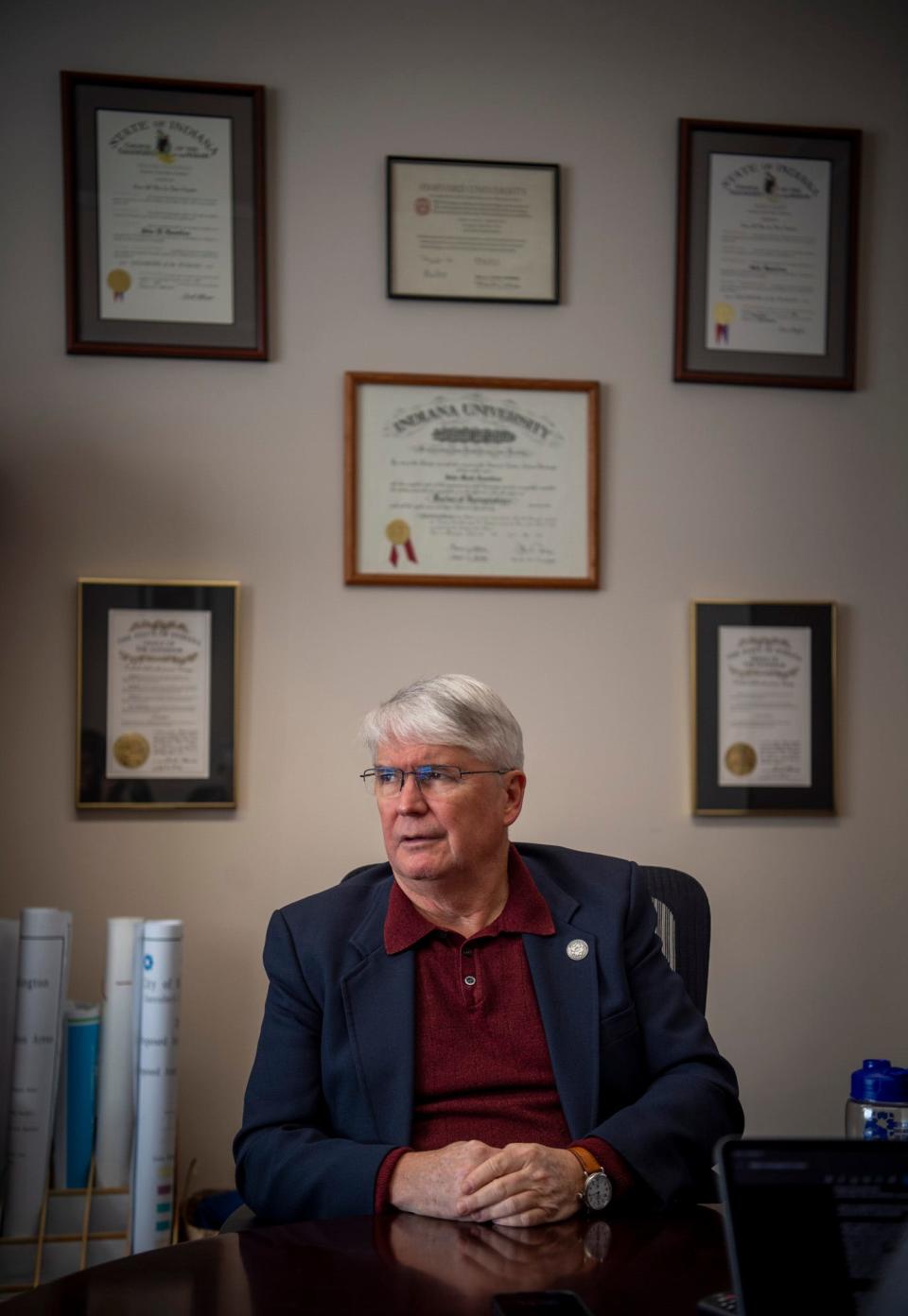
It's one reason I put $1 million in the 2024 budget, with the council's support, to say this is too important not to make more progress on even though it's not the city's direct responsibility. So I wish we had made more progress on that because I think we see the impact of that across the city. The state is among the lowest investors in public health in the country per capita. That damages us. We need to step up and do more.
Public health is a big challenge right now in front of us, including the relationship to criminal justice. We continue to be highly under invested in preventative health care, mental health interventions. And that's difficult for a city to do on our own. It really does take national and state support, but we are doing a lot that we can as a city and county. I think the county should be doing more on public health and at least as much on that as they're thinking about for the criminal justice reforms.
Q: How has the relationship between the city and county changed over the last eight years and what were the major drivers of that change?
JH: The first thing to say is that the city and county interact and collaborate exceedingly well every day, every week, in many, many ways. Through planning, highway and street maintenance, parks coordination, animal welfare, IT, law enforcement, public safety.
There are a few areas where an ambitious city government that has wanted to advance the city's success and the whole region's success has banged into a more, I guess I would say, conservative or less activist county government. That happened certainly with annexation. It happened with the convention center and those have both been areas of disagreement, frankly, on what should be done. Disagreement is fine.
Public health, public safety and climate are other examples. We have a regional climate initiative. The county hasn't joined me yet. The county does not have any significant climate plan. I think this is a great opportunity to step into one and they just take a long time to consider a review.
My job is to do the best I can as the mayor to advance this city's future and this whole region's future. I think the county sometimes has a different vision of what the future of the community should look like. And we continue to try to work through that.
Despite pandemic, farmers market, house fire, city 'done a lot of good'
Q: Looking back over your time as mayor, what stands out?
JH: I think about two big categories. One is what I came in wanting to do, and how that went. And then I look at what happened that we didn't know or expect or plan and kind of how we handled those.
On that latter side of course, the pandemic is the first and was a huge challenge for us as a city government, for this office and for our community, with the terrible recession that hit us, too. And I'm really proud of the way this community came together, the way we helped our residents get through and how we helped our institutions survive. I'm very proud of the way the federal government partnered with us in 2021 and beyond. And then I also think about what I view as the worst presidency in American history, having to deal with that and the implications there.
I think about climate change as a demand that just kept accelerating. And I think about inclusion like the challenges that the Black Lives Matter movement has raised and the fundamental nature of making sure we're a community and a government that is as inclusive as we should be.
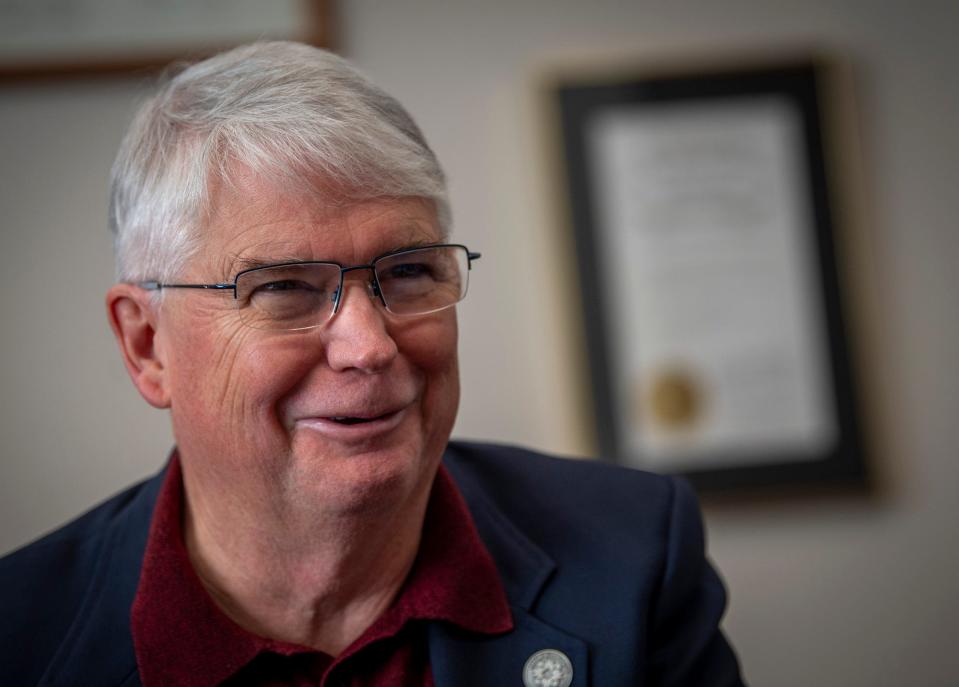
And then there's little, episodic things like the Farmers Market event or the house that we burned down. Those things that, in the midst of it, they can feel like a consuming event, but I've always tried to recognize that they will pass, but you got to think about that trajectory of the city. I'm very proud of how we made progress on those or survived those challenges.
Then on the former, I came in wanting to improve our economy, wanting to improve affordable housing, wanting to improve infrastructure, particularly digital infrastructure, wanting to be a more transparent government. And I think we've done a lot of good on all of those things. And I use the word we because, of course, you know, I'm really proud of the people that are in city government, the vast majority of whom were here when I came in and are going to be here when I leave, and then there's those that I brought in and who've helped lead departments, and I think there's been a really terrific bunch of colleagues and collaborations we do with people outside city government.
Q: What are you going to do after you leave office?
JH: I haven't made specific plans for what I'll be doing. Look, I love being involved in the world, being involved in the community, involved in political, public interest things. I haven't decided exactly what I'll do. So I'll sleep a little bit in January, relax a little bit.
I'm a native of Bloomington. I love Bloomington and plan to spend time here, too, but assuming Dawn continues in Washington, D.C., next year, I'll spend a fair amount of time with her.
Q: But you’re not selling your house?
JH: No. We love the corner of Woodlawn and University.
Q: Any last words?
JH: It's been a great privilege to serve as mayor with the City Council that we have, with the community that we have. I feel like this ambitious community needs to keep those ambitions high and to pursue excellence. And city government is a fundamental partner in that. I'm really proud of what we've done over the last eight years. I'll be cheering on the next chapter from a different seat, but it's been a real privilege to be the mayor.
Boris Ladwig can be reached at bladwig@heraldt.com.
This article originally appeared on The Herald-Times: Hamilton reflects on 8 years as Bloomington mayor ahead of last day

